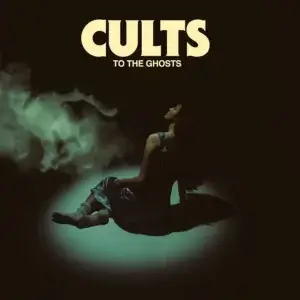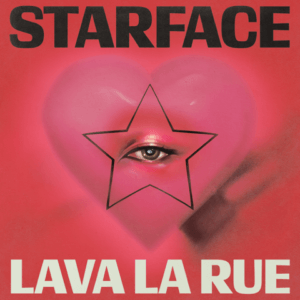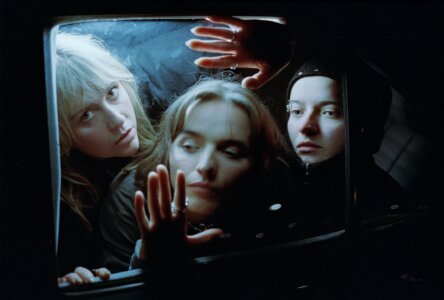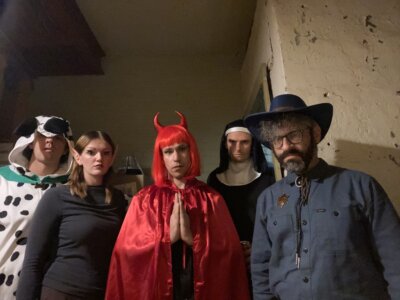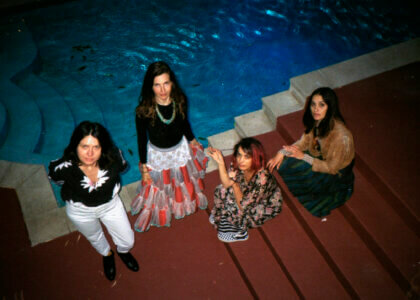It’s Not All Grim With Sleaford Mods
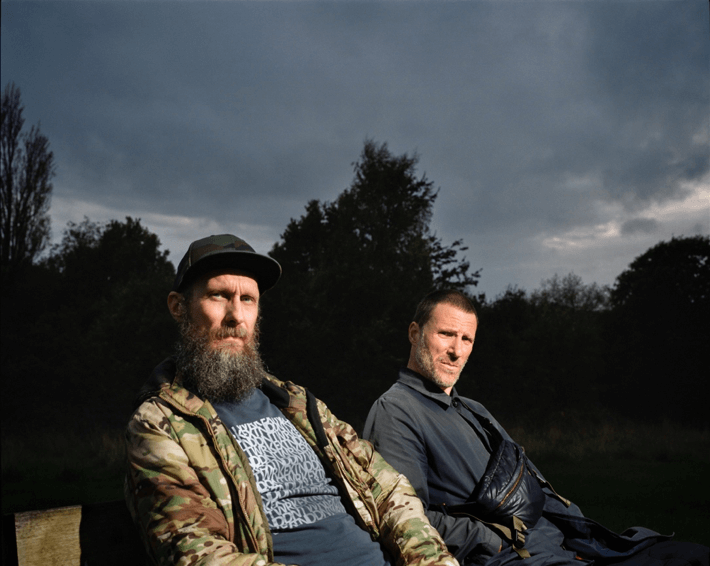
The first single from Sleaford Mods’ UK GRIM begins with an relentless bass beat. Then Jason Williamson’s characteristic East Midland-accented bark enters the scene – he’s got “crisis stamina”, and that is an understatement. “In England,” he spits, “nobody can hear you scream,” but that doesn’t stop him from trying, accompanied by Andrew Fearn’s infectious yet spare beats. If you are familiar with Sleaford Mods, you know what to expect, and the duo delivers on this record just as much as they have on the last six that came before. If this is your first encounter, buckle up and enjoy. Yes, Williamson will yell at you for almost an hour, but you will come out the other side wanting more. This time around the Mods have called on other people to join in, including Dry Cleaning‘s Florence Shaw on the cinematic “Force 10 From Navarone”, and 1990s legends Dave Navarro and Perry Farrell contribute to “So Trendy“, a song about facial recognition, a mysterious jet-pack man and selfies.
Given the present cost of living crisis in the UK, it seems like UK GRIM is just what the doctor ordered. Every song is a fresh perspective on fresh hell, and Williamson is perhaps one of the most intensely acerbic commentators on day-to-day life in late stage capitalism. He always has more to say, because this reality is relentless. Over zoom, Northern Transmissions caught up with Williamson and discussed the new music, performance, and enjoying the dark side of Miley Cyrus.
This interview has been edited and condensed.
Northern Transmissions: Could you tell me a little bit about the title of the album and what this record is attempting to do?
Jason Williamson: The title came from it was a play on words: UK grime, UK grim – we used #UKGRIM as a hashtag for the last album campaign. Initially I thought it was a bit of a cheesy title for an album, to be honest. I wasn’t convinced, but as time went on, it became clear that so what, you know, things are grim. There’s no other way to call it anything else, you know? I just wanted to again try and document a time in English history like we have with all the other albums.
NT: You’ve made comments about how in pop music there are so many songs that are about love and this perhaps that doesn’t necessarily reflect people’s day-to-day reality. With an album title like UK GRIM, I don’t think you disagree with me that over your prolific career that grim does capture the feeling of a lot of the lyrics.
JW: [laughs]
NT: I’m just wondering, given that the entire history of popular music keeps talking love and relationships, what does it mean to continually document this other reality, and how important is it to you to do so?
JW: What it means to me a lot of the time is I don’t like it. It’s like, what am I doing? You know? Is this boring? But there’s nothing else to write about. I don’t want to write about love. I don’t find that interesting. Love to me is something that you should experience intimately. Why would I want to tell the world about it? The idea of love is not some glossy state of thinking that that never changes. It’s continually odds with itself. So don’t really want to talk about that. But at the same time, I’m aware of the fact that we, in a lot of people’s eyes, we just carry the same old message, and it’s boring. But there’s nothing else to talk about. And when all the fuss dies down about us, I’ll still be writing the same thing I would imagine. The constraints of society are something that always interests me. Are these constraints as close to me as they were 10 years ago? No, they’re not. But in a lot of respects, yes, they are. You don’t really get away with a lot of things. Money helps, but you know, at the end of the day, you still have to face yourself. And I think there’s a lot of observational lyricism and political lyricism, but also a lot of internal lyricism about myself, about my own history, about my memories, about who I am. So all of that goes into the mix as well.
NT: The week your album was released, the number one album on the UK charts Miley Cyrus’s album, Endless Summer Vacation. Your record is number three. Given the state of affairs in the UK (and everywhere, really), it’s possible to face the grim or perhaps try to take a vacation from it. But maybe there’s a need to focus on what’s actually happening. Do you see yourself as providing a balance to that desire to ignore what’s actually happening?
JW: Yeah, of course. And in some respects that perhaps justifies it. But I would say that if you listen to Miley Cyrus, she certainly doesn’t sound like she’s having an endless summer vacation! Her voice is completely laden with darkness. And I think that’s what’s quite appealing about Miley Cyrus. I think it is clear that she is in the grips of a major label and their ideology. She talks about getting into a Mercedes and driving through the hills: lyrics that we’ve heard a thousand times. But you could also argue that the lyrics I do you’ve heard a thousand times. I would like to think that I do it in a more creative way, but I think she does it with her voice. You can’t deny that that album, some of it I think is very good, you know what I mean? So, yes. There needs to be a kind of transparent balance, because a lot of people will take Miley’s album as an endless summer vacation.
NT: When you perform you bring ridiculous amounts of energy. What is it like to be able to capture this onstage energy over and over and over again?
JW: Just keeping yourself fit really. But also, a lot of the time I just haven’t got a very good opinion about the music or myself, especially touring. It is quite a lonely thing. We’re a lot older than most of our contemporaries, so that can jar, and the self-doubt or the self-disbelief can kick in and all of these things can add to the anger in a show. It’s the way I see gigs. Every gig, I’ve got to go out there – and Andrew as well – we’ve got to prove ourselves every gig. People’s expectations are such these days that if you do a crap gig it travels fast on the internet. I don’t want that, so to me it’s a challenge. But at the same time, I’m just pissed off. A lot of the time. You can tell [laughs], I’m pissed off today! I’ve got nothing to be pissed off about. But again, the idea of who I am and what this band means, it constantly kicks in. So that really does that really does dress the energy, I think.
NT: In 2023, there’s sort of seems to be a lot of bands from the UK who were big in the nineties, who are around the same age, perhaps, when you’re talking about your contemporaries. I’m just wondering what do you think it is about right now that people want to hear from folks that are older.
JW: I think as the corruption has carried on in this country, people are becoming more conscious of it, and therefore perhaps want to hear that in music. I don’t know if that has been partly why UK Grim has been so successful. It’s our seventh album. It changes in so many areas depending on where you play. You know, we get younger audiences in some places. We get older audiences in others, you know what I mean? But I would say that the majority of people still the mass audience, still want to hear a more passive, simplistic message, you know what I mean?
NT: There’s also so much specificity to your music. How important is it to you to capture these kinds of references that allow people to either learn about your experience or feel themselves reflected in music?
JW: It’s important for me to put it down, and it’s important for me to garner a lot of things that I find quite oppressive or have been kind of cultural pointers or just aspects on the field of memory. Whether or not people get it is secondary, really. It’s nice if they do, but I don’t expect a lot of people to, because they are, as you say, very specific and very specific to a generation that might not necessarily be listening to this music, you know? It is nice when people do get it, but that is secondary.
NT: I live in Quebec and when you watch some Quebec programs, which are in French and therefore this moves them outside of the general understanding of the English speaking world. They’re also very particular with regards to the experience of being representations of working class Quebec life over the past number of decades. They recently have become quite popular on Netflix with the addition of subtitling. What I find, however, is that the more specific you are, the more it allows you to be universal.
JW: That’s quite interesting actually.
NT: An attempt to communicate with the widest audience ends up not connecting so much because it just connects with no one. Have there been any kind of odd moments of connection that you’ve found between your experience and that of people who are from other spaces?
JW: Yeah. Completely. In the music more than anything, perhaps in the energy of it in the facial expressions perhaps. We started getting gaining traction in Europe before the UK so people responded to it in a way because there’s a lot of familiarity. And also, let’s face it, English is quite a popular language. So even if you can’t understand a lot of it, there is some kind of perhaps verbal connection there as well. I think the frustration and aggression and anger and the energy is very relatable. It kind of speaks more volumes than actually the lyrics, even if someone understands the words.
NT: Do you ever worry about your music being co-opted by people who you firmly disagree with?
JW: No, not yet. I think because I would say that the lyrical content is so against what they believe in that I would, I would imagine it would be like, you know, the Nazis trying to use the teachings of the Frankfurt School of critical thinking to their own devices. I don’t want to compare myself to the Frankfurt School at all, but do you know what I’m saying? I’ve got no qualms that that they’re just not interested at all. I don’t think it’s something that perhaps that’s hit a lot of their radars, you know? The gatekeepers are not necessarily bothered about the existence of Sleaford Mods. So they’ve probably not been exposed to it, but if they were I can’t see how it could be used. I mean there’s every possibility it could be. But at the minute, no, it doesn’t bother me.
NT: I listened to a recent interview that you did where you talk about sort of folks in leadership like the Rishi Sunaks of the world who are less like demonic and bad, and more just completely and totally out of touch. I think that your music, if you wanted to describe it, is very in touch. That seems to be the goal: to see how in touch you can be with a, with yourself, with where you come from. Is there a way of translating this into change?
JW: Change in myself: yeah. But anybody else, it’s hard really. I would say predominantly our audience are left leaning or believing some kind of humanist ideology rather than some fucking whatever. I’m not a big believer that things can, music can change things. I don’t think we’re as powerful as someone like Bob Marley was, you know what I mean? Or anything like that. I’m very skeptical about that.
NT: We all need someone who can document it.
JW: Yes, very much so.
Interview by Erin MacLeod
Order UK Grim by Sleaford Mods HERE
Latest Reviews
Tracks
Advertisement
Looking for something new to listen to?
Sign up to our all-new newsletter for top-notch reviews, news, videos and playlists.


